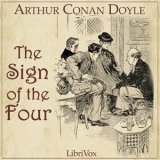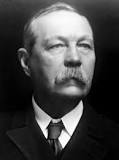The Sign of the Four Page #7
The Sign of the Four, also called The Sign of Four, is the second novel featuring Sherlock Holmes written by Sir Arthur Conan Doyle. Doyle wrote four novels and 56 short stories featuring the fictional detective.
"You will excuse me, Mr. Sholto," said Miss Morstan, "but I am here at your request to learn something which you desire to tell me. It is very late, and I should desire the interview to be as short as possible." "At the best it must take some time," he answered; "for we shall certainly have to go to Norwood and see Brother Bartholomew. We shall all go and try if we can get the better of Brother Bartholomew. He is very angry with me for taking the course which has seemed right to me. I had quite high words with him last night. You cannot imagine what a terrible fellow he is when he is angry." "If we are to go to Norwood it would perhaps be as well to start at once," I ventured to remark. He laughed until his ears were quite red. "That would hardly do," he cried. "I don't know what he would say if I brought you in that sudden way. No, I must prepare you by showing you how we all stand to each other. In the first place, I must tell you that there are several points in the story of which I am myself ignorant. I can only lay the facts before you as far as I know them myself. "My father was, as you may have guessed, Major John Sholto, once of the Indian army. He retired some eleven years ago, and came to live at Pondicherry Lodge in Upper Norwood. He had prospered in India, and brought back with him a considerable sum of money, a large collection of valuable curiosities, and a staff of native servants. With these advantages he bought himself a house, and lived in great luxury. My twin-brother Bartholomew and I were the only children. "I very well remember the sensation which was caused by the disappearance of Captain Morstan. We read the details in the papers, and, knowing that he had been a friend of our father's, we discussed the case freely in his presence. He used to join in our speculations as to what could have happened. Never for an instant did we suspect that he had the whole secret hidden in his own breast,--that of all men he alone knew the fate of Arthur Morstan. "We did know, however, that some mystery--some positive danger--overhung our father. He was very fearful of going out alone, and he always employed two prize-fighters to act as porters at Pondicherry Lodge. Williams, who drove you to-night, was one of them. He was once light-weight champion of England. Our father would never tell us what it was he feared, but he had a most marked aversion to men with wooden legs. On one occasion he actually fired his revolver at a wooden-legged man, who proved to be a harmless tradesman canvassing for orders. We had to pay a large sum to hush the matter up. My brother and I used to think this a mere whim of my father's, but events have since led us to change our opinion. "Early in 1882 my father received a letter from India which was a great shock to him. He nearly fainted at the breakfast-table when he opened it, and from that day he sickened to his death. What was in the letter we could never discover, but I could see as he held it that it was short and written in a scrawling hand. He had suffered for years from an enlarged spleen, but he now became rapidly worse, and towards the end of April we were informed that he was beyond all hope, and that he wished to make a last communication to us. "When we entered his room he was propped up with pillows and breathing heavily. He besought us to lock the door and to come upon either side of the bed. Then, grasping our hands, he made a remarkable statement to us, in a voice which was broken as much by emotion as by pain. I shall try and give it to you in his own very words. "'I have only one thing,' he said, 'which weighs upon my mind at this supreme moment. It is my treatment of poor Morstan's orphan. The cursed greed which has been my besetting sin through life has withheld from her the treasure, half at least of which should have been hers. And yet I have made no use of it myself,--so blind and foolish a thing is avarice. The mere feeling of possession has been so dear to me that I could not bear to share it with another. See that chaplet dipped with pearls beside the quinine-bottle. Even that I could not bear to part with, although I had got it out with the design of sending it to her. You, my sons, will give her a fair share of the Agra treasure. But send her nothing--not even the chaplet--until I am gone. After all, men have been as bad as this and have recovered. "'I will tell you how Morstan died,' he continued. 'He had suffered for years from a weak heart, but he concealed it from every one. I alone knew it. When in India, he and I, through a remarkable chain of circumstances, came into possession of a considerable treasure. I brought it over to England, and on the night of Morstan's arrival he came straight over here to claim his share. He walked over from the station, and was admitted by my faithful Lal Chowdar, who is now dead. Morstan and I had a difference of opinion as to the division of the treasure, and we came to heated words. Morstan had sprung out of his chair in a paroxysm of anger, when he suddenly pressed his hand to his side, his face turned a dusky hue, and he fell backwards, cutting his head against the corner of the treasure-chest. When I stooped over him I found, to my horror, that he was dead. "'For a long time I sat half distracted, wondering what I should do. My first impulse was, of course, to call for assistance; but I could not but recognize that there was every chance that I would be accused of his murder. His death at the moment of a quarrel, and the gash in his head, would be black against me. Again, an official inquiry could not be made without bringing out some facts about the treasure, which I was particularly anxious to keep secret. He had told me that no soul upon earth knew where he had gone. There seemed to be no necessity why any soul ever should know. "'I was still pondering over the matter, when, looking up, I saw my servant, Lal Chowdar, in the doorway. He stole in and bolted the door behind him. "Do not fear, Sahib," he said. "No one need know that you have killed him. Let us hide him away, and who is the wiser?" "I did not kill him," said I. Lal Chowdar shook his head and smiled. "I heard it all, Sahib," said he. "I heard you quarrel, and I heard the blow. But my lips are sealed. All are asleep in the house. Let us put him away together." That was enough to decide me. If my own servant could not believe my innocence, how could I hope to make it good before twelve foolish tradesmen in a jury-box? Lal Chowdar and I disposed of the body that night, and within a few days the London papers were full of the mysterious disappearance of Captain Morstan. You will see from what I say that I can hardly be blamed in the matter. My fault lies in the fact that we concealed not only the body, but also the treasure, and that I have clung to Morstan's share as well as to my own. I wish you, therefore, to make restitution. Put your ears down to my mouth. The treasure is hidden in--' At this instant a horrible change came over his expression; his eyes stared wildly, his jaw dropped, and he yelled, in a voice which I can never forget, 'Keep him out! For Christ's sake keep him out!' We both stared round at the window behind us upon which his gaze was fixed. A face was looking in at us out of the darkness. We could see the whitening of the nose where it was pressed against the glass. It was a bearded, hairy face, with wild cruel eyes and an expression of concentrated malevolence. My brother and I rushed towards the window, but the man was gone. When we returned to my father his head had dropped and his pulse had ceased to beat.
Translation
Translate and read this book in other languages:
Select another language:
- - Select -
- 简体中文 (Chinese - Simplified)
- 繁體中文 (Chinese - Traditional)
- Español (Spanish)
- Esperanto (Esperanto)
- 日本語 (Japanese)
- Português (Portuguese)
- Deutsch (German)
- العربية (Arabic)
- Français (French)
- Русский (Russian)
- ಕನ್ನಡ (Kannada)
- 한국어 (Korean)
- עברית (Hebrew)
- Gaeilge (Irish)
- Українська (Ukrainian)
- اردو (Urdu)
- Magyar (Hungarian)
- मानक हिन्दी (Hindi)
- Indonesia (Indonesian)
- Italiano (Italian)
- தமிழ் (Tamil)
- Türkçe (Turkish)
- తెలుగు (Telugu)
- ภาษาไทย (Thai)
- Tiếng Việt (Vietnamese)
- Čeština (Czech)
- Polski (Polish)
- Bahasa Indonesia (Indonesian)
- Românește (Romanian)
- Nederlands (Dutch)
- Ελληνικά (Greek)
- Latinum (Latin)
- Svenska (Swedish)
- Dansk (Danish)
- Suomi (Finnish)
- فارسی (Persian)
- ייִדיש (Yiddish)
- հայերեն (Armenian)
- Norsk (Norwegian)
- English (English)
Citation
Use the citation below to add this book to your bibliography:
Style:MLAChicagoAPA
"The Sign of the Four Books." Literature.com. STANDS4 LLC, 2025. Web. 22 Jan. 2025. <https://www.literature.com/book/the_sign_of_the_four_100>.




Discuss this The Sign of the Four book with the community:
Report Comment
We're doing our best to make sure our content is useful, accurate and safe.
If by any chance you spot an inappropriate comment while navigating through our website please use this form to let us know, and we'll take care of it shortly.
Attachment
You need to be logged in to favorite.
Log In